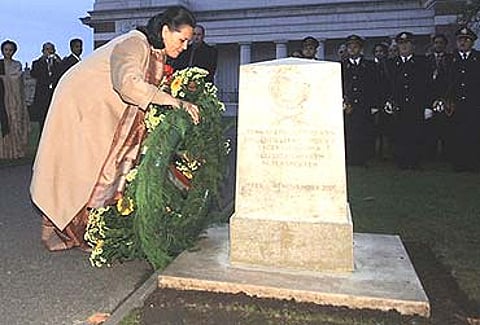The Reluctant Diplomat
Sonia led the gathering in a minute of silence but her silence continued through the evening. Why this austere aura and a refusal to speak to the people?
The mystique of Sonia Gandhi is formidable and it seems to work even beyondIndia's borders. Just ask the Belgians who went into overdrive last week towelcome her in an unprecedented show of hospitality. They threw all caution andcomfort to the winds, giving Sonia the reddest of red carpet welcomes. It wasmore than a head of government might have received. That her only day inBrussels was a Saturday hardly seemed to matter -- the Belgian government androyalty were both at work. She lunched with King Albert and Queen Paola, dinedwith Prime Minister Guy Verhofstadt, received Belgium's second highest honor,the Order of Leopold and got an honorary doctorate from Vrijet UniversiteitBrussel -- all in the span of 24 hours. That's packing it in.
Sonia was in Brussels to inaugurate "Tejas," the most ambitious, completeand inspired journey through 1,500 years of Indian art via 200 sculpturesborrowed from 26 somewhat reluctant museums around India. Given the scale of theexhibition, the level of difficulty and breadth of scope, it was deemed thatonly Sonia's shine could match the brilliance of the exhibits. Sure, she senta surge through the glamour meter of Brussels, generally home to blue suitedbureaucrats of EU, but she stayed aloof and decidedly distant. At least for the "aam admi" and"aam media."
Why this austere aura and a refusal to speak to the people? One canunderstand security concerns at a large, bubbling public meeting and I fullyappreciate her situation but this was one of the most scripted and controlledvisits one has ever seen. All media had been thoroughly checked before beingallowed access to the sites where Sonia was to appear. No less than 18 SPG menwere guarding her along with Belgian security at all times. And it is not as ifshe didn't have time. She had both mornings free. Besides the disappointedIndian journalist contingent, the Belgian media were hopping mad for not beingable to speak a word to the lady who inaugurated the biggest Indian festival intheir city. Even George Bush, with his tendency for gaffes, has been forced toappear for more press conferences as a democratic exercise in people's rightto know.
Sonia was representing India abroad and the interest in her was whollylegitimate. No one was trying to invent a story where there was none. Editors ofthree television channels, two news agencies, two magazines and three dailynewspapers had sent journalists to cover her visit. But no one got even withinsmiling distance of Sonia Gandhi. Her minister-in-waiting Ambika Soni, looking atrifle worried, said she had refused all requests for interviews. Members of herentourage seemed on edge, somewhat frightened and thoroughly in awe. It wasapparent that no one could confidently talk to her, god forbid advise her onwhat she was doing wrong. She seems to reside behind a very high wall.

During a short visit to Ieper, a historic town about 130 km from Brussels,Sonia laid a wreath at the memorial to an estimated 34,000 Indian soldiers whodied in the bloody fields of Flanders fending off the Germans in World War I aspart of the British colonial army. So far so good -- she was the first majorIndian politician to visit Menin Gate and deserves praise. But she didn'tspeak at the short, solemn ceremony, leaving the clutch of veterans andtownspeople disappointed. She led the gathering in a minute of silence but hersilence continued through the evening. It was decided that only the Indianambassador would speak, according to officials who dared to explain Sonia'smysterious ways.
The more officials tried to create "television moments", the faster shewalked. Even an on-the-spot decision for her to walk to the wall where names ofIndian sepoys were inscribed turned into a fast-forward rush. The names didn'tseem to beckon her long enough for a gaze. The mayor of Ieper, Luc Dehaene,dressed in his ceremonial sash, then escorted her to the town hall, delivered awarm speech of welcome and waited for some words from Sonia in return. But nonecame as she abruptly got up, exchanged gifts and began walking out. The tea andthe champagne were left untouched and the mayor bewildered at this strange,all-too-brief encounter. It was all over before members of her entourage hadeven taken their seats.
Perhaps she didn't read her programme carefully, perhaps she didn't seemapproachable enough for a briefing where things could be explained or perhapsshe just was too tired from her flight. Whatever the reason, those at thereceiving end were left baffled and a little hurt. Their excitement at welcomingIndia's most powerful woman in their midst slowly evaporated. It is alwayspossible to say a few words of thanks from the podium even for the mostreluctant of politicians, the most reticent of personalities. Whether she likesit or not, the world perceives her as the real power behind the throne of Indiandemocracy. It was not a coincidence that the Belgian prime minister personallyurged her to inaugurate the Tejas exhibition after she suddenly cancelled herplans two weeks ago, citing domestic political reasons. He knew it would be adiplomatic coup to get Sonia.
If she were to grow into a confident representative of a new India and speakher mind on topics that move her, she would be a giant magnet in a sari. ImagineSonia holding forth at international conferences on gender equality, religioustolerance, climate change, war and peace, poverty alleviation -- it wouldresonate loudly.
But who will tell her that her star power can help India abroad?
Tags